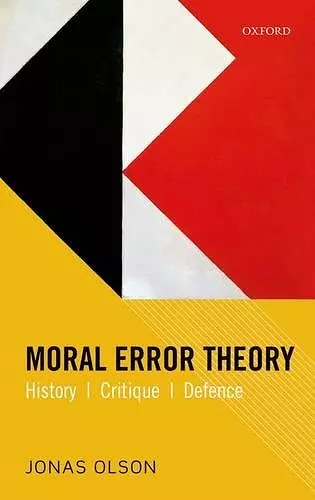Moral Error Theory
History, Critique, Defence
Format:Hardback
Publisher:Oxford University Press
Published:23rd Jan '14
Currently unavailable, and unfortunately no date known when it will be back
This hardback is available in another edition too:
- Paperback£34.49(9780198769972)

Jonas Olson presents a critical survey of moral error theory, the view that there are no moral facts and so all moral claims are false. In Part I (History), he explores the historical context of the debate, and discusses the moral error theories of David Hume and of some more or less influential twentieth century philosophers, including Axel Hägerström, Bertrand Russell, Ludwig Wittgenstein, and Richard Robinson. He argues that the early cases for moral error theory are suggestive but that they would have been stronger had they included something like J. L. Mackie's arguments that moral properties and facts are metaphysically queer. Part II (Critique) focuses on these arguments. Olson identifies four queerness arguments, concerning supervenience, knowledge, motivation, and irreducible normativity, and goes on to establish that while the first three are not compelling, the fourth has considerable force, especially when combined with debunking explanations of why we tend to believe that there are moral properties and facts when in fact there are none. One conclusion of Part II is that a plausible error theory takes the form of an error theory about irreducible normativity. In Part III (Defence), Olson considers challenges according to which that kind of error theory has problematic ramifications regarding hypothetical reasons, epistemic reasons, and deliberation. He ends his discussion with a consideration of the implications of moral error theory for ordinary moral thought and talk, and for normative theorizing.
For the most part, Olson is a lucid writer and it is refreshing to see a philosopher write candidly about the limitations of even his own arguments... the book will likely generate fruitful discussion for years to come. In particular, metaethicists will want to consider Olson's case for moral error theory in chs 5 through 9. Hume scholars might want to consider ch. 2, and those interested in metaepistemology may benefit from reading ch. 8. * Jeff Wisdom, Philosophical Quarterly *
Olson's Moral Error Theory offers a historically informed and theoretically subtle discussion of moral error theory in response to the much greater attention this view has received in the last decade. * Hallvard Lillehammer. International Journal for the Study of Skepticism *
Jonas Olson's book is a fascinating, multifaceted exploration of moral error theory and will be a thought-provoking read for anyone with metaethical interests. * Matt Lutz and Stephen Finlay, Ethics *
Olson's book covers a lot of ground. It can be quite technical at times, so some previous knowledge of the metaethical debates surrounding moral error theory is helpful. For those interested in these debates, it is a must read. * Félix Aubé Beaudoin, Dialogue: Canadian Philosophical Review *
I liked Olson's book. It is clear and engaging which is particularly noteworthy given the complex terminology which haunts metaethics. Olson's timely work is subtle and has philosophical depth and, as well as using it for my own research, I will be recommending this book to my third year and PG students. * Analysis *
I enjoyed reading Olson's book. It is interesting and clearly written, suitable both for upper-level undergraduates and more advanced students of philosophy. . . . I can recommend it unreservedly. * Daan Evers, Notre Dame Philosophical Reviews *
ISBN: 9780198701934
Dimensions: 222mm x 144mm x 21mm
Weight: 870g
224 pages